We wouldn’t dream of abandoning our vast semi–annual Most Anticipated Book Previews, but we thought a monthly reminder would be helpful (and give us a chance to note titles we missed the first time around). Here’s what we’re looking out for this month—for more August titles, check out our Second-Half Preview. Let us know what you’re looking forward to in the comments!
Want to know about the books you might have missed? Then go read our most recent book preview. Want to help The Millions keep churning out great books coverage? Then sign up to be a member today.
Coventry by Rachel Cusk: Cusk’s Outline trilogy—or as I think of it, The Cuskiad—is a masterpiece of modern literature, a formally adventurous exercise in narrative erasure that explores marriage, divorce, family, art, and representation. In her forthcoming essay collection Coventry, Cusk groups these thematic concerns into three sections, broadly: memoir, art, and criticism—although as Publishers Weekly says, the enterprise is bound by “the uses of narrative, particularly for allowing people to make sense of their lives… something Cusk interrogates exceptionally well throughout this well-crafted compilation.” (Adam P.)
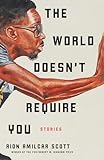 The World Doesn’t Require You by Rion Amilcar Scott: If Scott’s talent didn’t catch your attention with Insurrections, his award-winning debut, he’ll draw even more readers with this second book. Cross River, Maryland, the fictional town of his first book, returns in this new story collection. Scott can shift between irreverent and complex in a single story—a single sentence—as in “David Sherman, the Last Son of God”: “David didn’t believe what his older brother preached and wondered if Delante, who now called himself Jesus Jesuson (everyone, though, referred to him as Jeez), really believed, but he didn’t ask.” Also: all praise to story collections like this one that end with an anchoring novella! (Nick R.)
The World Doesn’t Require You by Rion Amilcar Scott: If Scott’s talent didn’t catch your attention with Insurrections, his award-winning debut, he’ll draw even more readers with this second book. Cross River, Maryland, the fictional town of his first book, returns in this new story collection. Scott can shift between irreverent and complex in a single story—a single sentence—as in “David Sherman, the Last Son of God”: “David didn’t believe what his older brother preached and wondered if Delante, who now called himself Jesus Jesuson (everyone, though, referred to him as Jeez), really believed, but he didn’t ask.” Also: all praise to story collections like this one that end with an anchoring novella! (Nick R.)
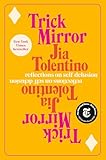 Trick Mirror by Jia Tolentino: Tolentino’s essay collection is rangy and deft—nothing is treated superficially here. “I wrote this book because I am always confused,” she says in the introduction, but what follows are ardent and skilled attempts to make sense of the world. She tackles our digital lives (“The internet reminds us on a daily basis that it is not at all rewarding to become aware of problems that you have no reasonable hope of solving.”), athleisure and women’s bodies (“These days, it is perhaps even more psychologically seamless than ever for an ordinary woman to spend her life walking toward the idealized mirage of her own self-image”), her evangelical childhood and departure from belief (“Christianity formed my deepest instincts: it gave me a leftist worldview, an obsession with everyday morality, an understanding of having been born in a compromised situation, and a need to continually investigate my own ideas about what it means to be good.”). Also: contemporary scams, her stint on reality TV, and the panoply of nuptials she attends: “My boyfriend maintains a running Google spreadsheet to keep track of the weddings we’ve been invited to together.” (Nick R.)
Trick Mirror by Jia Tolentino: Tolentino’s essay collection is rangy and deft—nothing is treated superficially here. “I wrote this book because I am always confused,” she says in the introduction, but what follows are ardent and skilled attempts to make sense of the world. She tackles our digital lives (“The internet reminds us on a daily basis that it is not at all rewarding to become aware of problems that you have no reasonable hope of solving.”), athleisure and women’s bodies (“These days, it is perhaps even more psychologically seamless than ever for an ordinary woman to spend her life walking toward the idealized mirage of her own self-image”), her evangelical childhood and departure from belief (“Christianity formed my deepest instincts: it gave me a leftist worldview, an obsession with everyday morality, an understanding of having been born in a compromised situation, and a need to continually investigate my own ideas about what it means to be good.”). Also: contemporary scams, her stint on reality TV, and the panoply of nuptials she attends: “My boyfriend maintains a running Google spreadsheet to keep track of the weddings we’ve been invited to together.” (Nick R.)
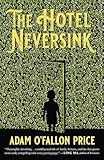 The Hotel Neversink by Adam O’Fallon Price: The second novel by Adam O’Fallon Price, a staff writer at The Millions, is the rambunctious, ambitious, decades- and generations-jumping tale of the Sikorsky family, who transform an abandoned mansion into the titular jewel of the Borscht Belt. Inspired by Grossinger’s Catskills Resort Hotel, Price uses a revolving cast of narrators to tell a story that is part murder mystery and part ghost story, with a dark secret lurking at its core. The novel asks a chilling question about the children who disappear from the towns and woods around the Hotel Neversink: Are they victims of coincidence, or part of a calculated plot to destroy the Sikorskys? (Bill)
The Hotel Neversink by Adam O’Fallon Price: The second novel by Adam O’Fallon Price, a staff writer at The Millions, is the rambunctious, ambitious, decades- and generations-jumping tale of the Sikorsky family, who transform an abandoned mansion into the titular jewel of the Borscht Belt. Inspired by Grossinger’s Catskills Resort Hotel, Price uses a revolving cast of narrators to tell a story that is part murder mystery and part ghost story, with a dark secret lurking at its core. The novel asks a chilling question about the children who disappear from the towns and woods around the Hotel Neversink: Are they victims of coincidence, or part of a calculated plot to destroy the Sikorskys? (Bill)
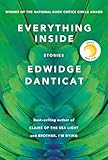 Everything Inside by Edwidge Danticat: A collection of eight vigorous, compelling stories provides a storyteller’s insight to how migration to and from the Caribbean affected people’s lives, personalities, and relationships. Lovers, deeply wounded by the catastrophic earthquake in Haiti in 2010, strive to reunite; an undocumented construction worker pictures his lover and adopted son in the last minute of his life; the christening of a baby reveals the chasm between the three generation of a family. “No one is immune from pain,” as Kirkus Review puts it, “but Danticat asks her readers to witness the integrity of her subjects as they excavate beauty and hope from uncertainty and loss.” (Jianan Qian)
Everything Inside by Edwidge Danticat: A collection of eight vigorous, compelling stories provides a storyteller’s insight to how migration to and from the Caribbean affected people’s lives, personalities, and relationships. Lovers, deeply wounded by the catastrophic earthquake in Haiti in 2010, strive to reunite; an undocumented construction worker pictures his lover and adopted son in the last minute of his life; the christening of a baby reveals the chasm between the three generation of a family. “No one is immune from pain,” as Kirkus Review puts it, “but Danticat asks her readers to witness the integrity of her subjects as they excavate beauty and hope from uncertainty and loss.” (Jianan Qian)
 The Yellow House by Sarah M. Broom: In 2015, Broom published an essay in The New Yorker about her family’s house in New Orleans that has sat with me since I read it. The piece starts with questions: “In the ten years since Hurricane Katrina, what has plagued me most is the unfinished business of it all. Why is my brother Carl still babysitting ruins, sitting on the empty plot where our childhood home used to be? Why is my seventy-four-year-old mother, Ivory Mae, still unmoored, living in St. Rose, Louisiana, at Grandmother’s house? We call it Grandmother’s even though she died ten years ago. Her house, the only one remaining in our family, is a squat three-bedroom in a subdivision just off the River Road, which snakes seventy miles along the Mississippi, where plantation houses sit alongside grain mills and petrochemical refineries.” The next year, she was a Whiting Fellow, and this year, readers can get their hands on the book, a gorgeous work of memoir and reporting about place and family that feels like the apotheosis of a form. (Lydia)
The Yellow House by Sarah M. Broom: In 2015, Broom published an essay in The New Yorker about her family’s house in New Orleans that has sat with me since I read it. The piece starts with questions: “In the ten years since Hurricane Katrina, what has plagued me most is the unfinished business of it all. Why is my brother Carl still babysitting ruins, sitting on the empty plot where our childhood home used to be? Why is my seventy-four-year-old mother, Ivory Mae, still unmoored, living in St. Rose, Louisiana, at Grandmother’s house? We call it Grandmother’s even though she died ten years ago. Her house, the only one remaining in our family, is a squat three-bedroom in a subdivision just off the River Road, which snakes seventy miles along the Mississippi, where plantation houses sit alongside grain mills and petrochemical refineries.” The next year, she was a Whiting Fellow, and this year, readers can get their hands on the book, a gorgeous work of memoir and reporting about place and family that feels like the apotheosis of a form. (Lydia)
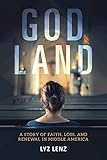 God Land: A Story of Faith, Loss, and Renewal in Middle America by Lyz Lenz: Lenz—a journalist whose profiles and personal essays are absolute must reads—brings a book that combines memoir and journalism. After the 2016 election, Lenz leaves her Trump-supporting husband and her church—and begins to travel to churches across the Midwest to understand the incomprehensible: faith in today’s America. Publishers Weekly’s starred review called the book a “slim but powerful debut on the faith and politics of Middle America.” (Carolyn)
God Land: A Story of Faith, Loss, and Renewal in Middle America by Lyz Lenz: Lenz—a journalist whose profiles and personal essays are absolute must reads—brings a book that combines memoir and journalism. After the 2016 election, Lenz leaves her Trump-supporting husband and her church—and begins to travel to churches across the Midwest to understand the incomprehensible: faith in today’s America. Publishers Weekly’s starred review called the book a “slim but powerful debut on the faith and politics of Middle America.” (Carolyn)
 White Flights: Race, Fiction, and the American Imagination by Jess Row: “White flight” typically refers to the movement of white Americans into segregated communities, but in this work of criticism, Row extends the term to literature. Combining memoir as well as literary, filmic, and musical analysis, Row argues for an understanding of writing as reparative, and fiction as a space in which writers might “approach each other again.” Kirkus calls it “wide-ranging, erudite, and impassioned.” (Jacqueline)
White Flights: Race, Fiction, and the American Imagination by Jess Row: “White flight” typically refers to the movement of white Americans into segregated communities, but in this work of criticism, Row extends the term to literature. Combining memoir as well as literary, filmic, and musical analysis, Row argues for an understanding of writing as reparative, and fiction as a space in which writers might “approach each other again.” Kirkus calls it “wide-ranging, erudite, and impassioned.” (Jacqueline)
 The Remainder by Alia Trabucco Zerán (translated by Sophie Hughes): Shortlisted for the 2019 Man Booker International Prize, Trabucco’s debut novel follows three friends from Santiago, Chile who embark on a road trip to find a missing coffin. Teeming ghosts, history, and trauma, Publishers Weekly’s starred review called it a “lyrical, surrealistic debut that is “vividly rooted in Chile, yet the quests at its heart—to witness and survive suffering, to put an intractable past to rest—are universally resonant.” (Carolyn)
The Remainder by Alia Trabucco Zerán (translated by Sophie Hughes): Shortlisted for the 2019 Man Booker International Prize, Trabucco’s debut novel follows three friends from Santiago, Chile who embark on a road trip to find a missing coffin. Teeming ghosts, history, and trauma, Publishers Weekly’s starred review called it a “lyrical, surrealistic debut that is “vividly rooted in Chile, yet the quests at its heart—to witness and survive suffering, to put an intractable past to rest—are universally resonant.” (Carolyn)
 The Memory Police by Yoko Ogawa (translated by Stephen Snyder): Critically acclaimed Japanese writer Ogawa’s new novel takes place in a society where objects disappear and where the terrifying Memory Police pursue citizens who recall the disappeared objects. The protagonist is a young novelist who discovers her editor is in danger and decides to hide him beneath her floorboards. The Memory Police explores trauma, loss, memory, and surveillance, and will astound readers. Chicago Tribune calls it “a masterful work of speculative fiction” and Esquire writes, “Ogawa’s taut novel of surveillance makes for timely, provocative reading.” (Zoë)
The Memory Police by Yoko Ogawa (translated by Stephen Snyder): Critically acclaimed Japanese writer Ogawa’s new novel takes place in a society where objects disappear and where the terrifying Memory Police pursue citizens who recall the disappeared objects. The protagonist is a young novelist who discovers her editor is in danger and decides to hide him beneath her floorboards. The Memory Police explores trauma, loss, memory, and surveillance, and will astound readers. Chicago Tribune calls it “a masterful work of speculative fiction” and Esquire writes, “Ogawa’s taut novel of surveillance makes for timely, provocative reading.” (Zoë)
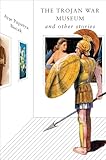 The Trojan War Museum by Ayşe Papatya Bucak: Apollo wanders through a museum, trying to make sense of war and his own history. A chess-playing automaton falls in love. Dead girls tell the story of a catastrophe and its aftermath. Bucak’s debut story collection is a surrealist wunderkammer in which the lines between history and myth, reality and performance, and the cultural and personal are blurred and redrawn. The result: “narratively precise” stories that “are also beautiful vignettes on human culture, deftly probing the fissures and pressure points of history and bringing up new forms,” writes The Millions’ own Lydia Kiesling. (Kaulie)
The Trojan War Museum by Ayşe Papatya Bucak: Apollo wanders through a museum, trying to make sense of war and his own history. A chess-playing automaton falls in love. Dead girls tell the story of a catastrophe and its aftermath. Bucak’s debut story collection is a surrealist wunderkammer in which the lines between history and myth, reality and performance, and the cultural and personal are blurred and redrawn. The result: “narratively precise” stories that “are also beautiful vignettes on human culture, deftly probing the fissures and pressure points of history and bringing up new forms,” writes The Millions’ own Lydia Kiesling. (Kaulie)
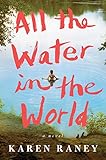 All the Water in the World by Karen Raney: Raney’s debut follows Maddy, a sixteen-year-old girl suffering from cancer, who decides to seek out her absent biological father, and herm other Eve, who is coming to understand her daughter and their shared reality. Publishers Weekly called the novel “a deep, genuine investigation of memory, the pain of loss, and the strength of a mother’s love.” (Carolyn)
All the Water in the World by Karen Raney: Raney’s debut follows Maddy, a sixteen-year-old girl suffering from cancer, who decides to seek out her absent biological father, and herm other Eve, who is coming to understand her daughter and their shared reality. Publishers Weekly called the novel “a deep, genuine investigation of memory, the pain of loss, and the strength of a mother’s love.” (Carolyn)
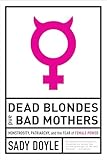 Dead Blondes and Bad Mothers by Sady Doyle: In a follow-up to Trainwreck, Doyle dives deep on monstrous women in pop culture and beyond. Spanning the Bible, The Craft, the mother of serial killer Ed Gein, and nearly everything in between, she explores the ways women have had to behave badly—like monsters sometimes—to exist in a world determined to see them fail. A starred review from Kirkus called it “unflinching, hard-charging feminist criticism.” (Carolyn)
Dead Blondes and Bad Mothers by Sady Doyle: In a follow-up to Trainwreck, Doyle dives deep on monstrous women in pop culture and beyond. Spanning the Bible, The Craft, the mother of serial killer Ed Gein, and nearly everything in between, she explores the ways women have had to behave badly—like monsters sometimes—to exist in a world determined to see them fail. A starred review from Kirkus called it “unflinching, hard-charging feminist criticism.” (Carolyn)
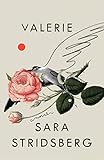 Valerie by Sara Stridsberg (translated by Deborah Bragan-Turner): Longlisted for the 2019 Man Booker International Prize, swedish feminist Stridsberg, through the use of an unnamed narrator, reimagines the life of Valerie Solanas, the author of the SCUM Manifesto and the woman who shot Andy Warhol. Vivian Gornick writes: “this is a brilliant re-imagining of the life and times of one of America’s great cultural icons.”
Valerie by Sara Stridsberg (translated by Deborah Bragan-Turner): Longlisted for the 2019 Man Booker International Prize, swedish feminist Stridsberg, through the use of an unnamed narrator, reimagines the life of Valerie Solanas, the author of the SCUM Manifesto and the woman who shot Andy Warhol. Vivian Gornick writes: “this is a brilliant re-imagining of the life and times of one of America’s great cultural icons.”
(Carolyn)
Image credit: Unsplash/S O C I A L . C U T.
The post August Preview: The Millions Most Anticipated (This Month) appeared first on The Millions.
Source : August Preview: The Millions Most Anticipated (This Month)










